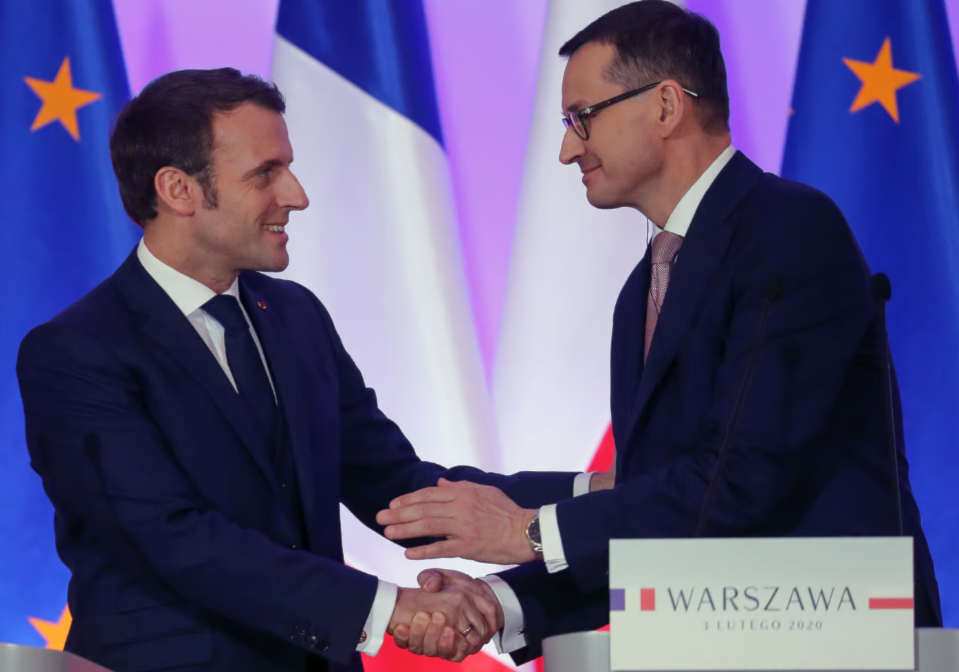Paris, Warsaw cannot speak for NATO: Italian Defense Minister
According to the Italian minister, NATO did not formally intervene in the war from the very beginning.
-

French President Emmanuel Macron (left) and Polish Prime Minister Mateusz Morawiecki meet on February 3, 2020 (AFP)
France and Poland have no authority to speak on behalf of NATO, and the alliance's engagement in the dispute would "erase the path to diplomacy," according to Italian Defense Minister Guido Crosetto in an interview published on Sunday by the Italian newspaper La Stampa.
Following a Ukraine summit in Paris on February 26, Macron stated that Western leaders had considered the idea of deploying soldiers to Ukraine, and that while no consensus had been achieved, nothing could be ruled out.
On Friday, Polish Defense Minister Radoslaw Sikorski stated that the presence of NATO military in Ukraine "was not unthinkable," and praised Macron's intention to send Western troops to Ukraine. Meanwhile, Polish President Andrzej Duda stated that Poland needed to build a big airport to facilitate the transit of NATO soldiers.
France's Foreign Minister Stephane Sejourne said there are no intentions to send French troops to Ukraine, contradicting the French President. Taking a swing at Macron, Sejourne clarified, "French people will not die for Ukraine. We will not send troops for combat."
Read more: Pope urges Kiev to pursue 'courage of the white flag' in peace talks
According to the Italian minister, "France and Poland cannot speak on behalf of NATO, which formally and voluntarily did not intervene in the conflict from the very beginning."
Crosseto added that sending troops to Kieb would be an escalation that would "erase diplomacy."
The minister noted that although European nations continue to assist Kiev, diplomatic efforts to help Ukraine restore its freedom, territory, and security must be intensified.
NATO deployment not up for discussion at the moment: French MoD
In a Friday interview with the RMC broadcaster, French Defense Minister Sebastien Lecornu stated that for now, sending NATO troops to Ukraine is not an option up for discussion, as other alternatives are being considered to aid Ukraine.
"We wanted to tell our allies about other options that we have, we discussed different hypotheses, but not sending military personnel to participate in hostilities, as some people interpreted it. The president [of France, Emmanuel Macron] said that we would not become complicit [in the Ukraine conflict]", he said.
"Nevertheless, have we tried everything in this field between sending weapons, as we are doing now, and complicity, which means direct war with Russia? Are there any ways that have not been tried yet?" Lecornu continued.
French President Emmanuel Macron declared last month that "there is no consensus today to send ground troops... but nothing should be excluded. We will do whatever it takes to ensure that Russia cannot win this war."
French politics shaped by Ukraine war
In France's politically divided landscape, Russia's war with Ukraine has become a significant and contentious issue.
Macron has been stressing the need for increased backing for Ukraine, sparking controversy last week by not dismissing the possibility of deploying Western troops to the region.
In a seeming reaction to Macron's statements, Putin cautioned about the genuine threat of nuclear conflict.
The upcoming European elections are viewed as a crucial step leading up to France's presidential election in 2027. Le Pen is anticipated to make her fourth attempt for the presidency, while Macron is ineligible to run again due to term restrictions.

 3 Min Read
3 Min Read








